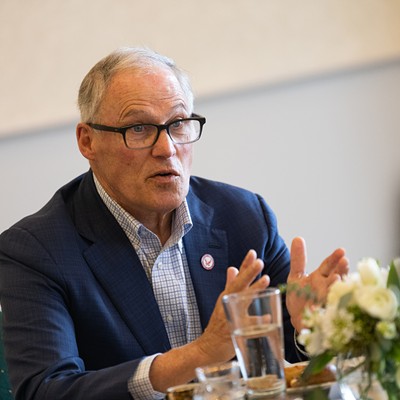Almost every Monday afternoon, a group of 12 Republicans meet, seated around a table in the Capitol. Speaker of the House John Boehner is there, as is House Majority Leader Eric Cantor.
Along with them is the vice-chairwoman of the House Republican Conference, Cathy McMorris Rodgers.
McMorris Rodgers holds a number of unique positions in that room. Representing most of Eastern Washington, she is the only representative from the Pacific Northwest. She also is the only woman elected to the leadership conference, and her position is the fifth-highest ranking in the House.
House Republicans are squarely in the spotlight these days as the country hurtles through uncharted and ominous fiscal territory, and McMorris Rodgers has taken her turn in the media glare. She’s appeared on Fox News, CNBC and MSNBC,
where she’s pilloried President Barack Obama and congressional Democrats for what she characterizes as overspending and failing to create jobs.
In the past, raising the debt limit has been a fairly routine affair. McMorris Rodgers went on the record in supporting a debt limit raise in 2006, but voted against it twice in 2008. The fight this time, she says, is to rein in a government that is spending at levels that could potentially send the country into a calamity like Greece faces.
“I don’t want to see America default. No one wants to see America default,” McMorris Rodgers tells The Inlander. “We’re negotiating in good faith to come up with a resolution to avoid that default.”
In a speech Monday night, Obama offered his own explanation for the stalemate: “The only reason this balanced approach isn’t on its way to becoming law right now is because a significant number of Republicans in Congress are insisting on a different approach — a cuts-only approach — an approach that doesn’t ask the wealthiest Americans or biggest corporations to contribute anything at all. And because nothing is asked of those at the top of the income scale, such an approach would close the deficit only with more severe cuts to programs we all care about — cuts that place a greater burden on working families.”
The latest offers from both parties would cut spending by different amounts, but the Republican proposal would raise the limit by an amount that would keep the government running for about six months. Obama and the Democrats want to fund the government through 2012 and the next presidential election.
But unless some agreement is reached by the end of this Monday, Aug. 2, the government will not be able to pay its bills, which some predict would be a national, if not global, financial disaster.
“This is a difficult request that the president has asked us,” McMorris Rodgers says. “I see us as being part of the solution.”
Things have changed for House Republicans since McMorris Rodgers was elected to the leadership conference in 2009. After the Republicans swept the 2010 midterm elections, the House became the spoiler to a Democrat-controlled Senate and White House.
“Well, when you’re in the minority, you’re responding to what the speaker and the majority are bringing to the floor every week,” McMorris Rodgers says. “When you’re in the majority, you are the ones determining every week.”
McMorris Rodgers doesn’t go to the White House to negotiate over the debt limit, but she does shoot emails back and forth with Cantor and will meet with Boehner periodically.
In conference meetings, she says she’d made her signature issue the balanced-budget constitutional amendment, which, if it were ratified by the states, would prohibit federal government spending from exceeding its revenue. She says she’s been pushing for this type of legislation since she was first elected in 2004.
“Not everyone around the table has been supportive,” McMorris Rodgers says of other House Republicans and their opinions of the change to the Constitution. “We’ve certainly had some debate.”
She scored a victory when the balanced-budget amendment was included in “Cut, Cap, Balance,” a proposal that passed out of the House last week.
The fate of this plan is instructive of the type of stridency that has gripped Congress since the 2010 midterm elections, a mood that Democrats have blamed on the election of a number of conservative freshman lawmakers.
Rep. Raúl Labrador is one of these freshmen, representing Coeur d’Alene and a swath of western Idaho. He says “Cut, Cap, Balance” is a compromise supported by a majority of American people and predicted the consequences for Senate Democrats would be dire if they did not pass it.
“Maybe [Senate Majority Leader] Harry Reid has zero percent chance of having a Democratic majority in 2012,” Labrador says.
Upon its arrival in the Senate, “Cut, Cap, Balance” was voted down, by a tally of 51 to 46.
In this climate of cutting, some see another threat: cuts too deep, causing layoffs among the sectors that Spokane relies on for its employment and well-being.
“[Some politicians] think that they’re going to get costs down by paying less for services,” says Ray Batina, a professor of economics at Washington State University. If spending is cut to proposed levels, Batina predicts that programs like Medicare and expenditures locally and statewide will suffer, sending dire economic ripples around Eastern Washington.
Batina says the blame for the rising debt lies with the wars and tax cuts started by the Bush administration and also with the economic stimulus package passed early in Obama’s administration.
“That probably did not stimulate jobs hardly at all,” Batina says of the stimulus package. But Batina says stopping spending could reverse any gains of the past few years. “On the flipside, when you stop spending, stop construction projects, are firing teachers, that’s going to have a huge impact.”
Former vice-chairwoman of the Washington State Democrats Sharon Smith agrees that the government needs to cut its spending. But she says the plans backed by McMorris Rodgers and fellow House Republicans would harm people in Eastern Washington who depend on programs like Medicaid.
“The people it doesn’t affect are the superwealthy, and that’s really a shame,” Smith says.
Any cuts made should be backed by an overhaul of the tax code, Smith says, to close loop holes and tax breaks that she says are no longer necessary.
“These are not job-generating loopholes,” says Smith, a former Spokane resident.
In a Reuters/Ipsos poll released on Tuesday, 31 percent of people held Republican lawmakers responsible for the debt impasse, 21 percent held the president responsible and 9 percent blamed Democratic lawmakers.
The poll was conducted after a rancorous Monday night that saw dueling speeches between the president and Boehner. In his speech, Obama asked the country to “make their voice heard” and contact their representatives about the debt ceiling.
That
plea apparently caused a flood of calls and emails to McMorris Rodgers
and other representatives, and on Tuesday, congressional websites were
crippled by the high traffic, says Todd Winer, communications director
for McMorris Rodgers.
Besides being in leadership, McMorris Rodgers is in a variety of caucuses — groups of lawmakers who meet and talk about common issues, like hydropower, the Air Force and disabilities.
“I found that that’s a good way to work both in a bipartisan fashion with other members on issues that are priorities for us,” McMorris Rodgers says.
Rep. Lois Capps, a California Democrat, disagrees with McMorris Rodgers on many things, she says, including the current debt crisis. But Capps, who sits with McMorris Rodgers on three subcommittees, says she and McMorris Rodgers have been able to collaborate on legislation and that she’s glad to watch her fellow congresswoman’s rise within the opposition.
“I’m pleased to see that women rise to leadership in whatever party they are and I’ve watched her rise in the Republican Party,” Capps says. “It’s harder for women to rise. My hat’s off to her.”
That rise has brought her to the White House, particularly early in this Congress, when the leadership conference headed over to the Oval Office to meet with Obama. Discussions with the commander-in-chief have been productive, she says, and a good way to find some common ground on issues of importance to both of them.
When asked what she thinks of a statement made by Sen. Mitch McConnell, R-Ky., that the goal of the Republicans is to make Obama a oneterm president, she agrees.
“I believe the country would be better served with a different president.”





















